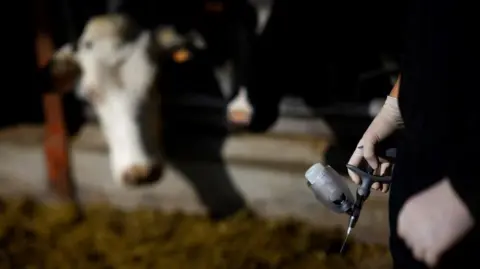Vaccination programme begins amid bluetongue fears
 Reuters
ReutersWarmer winters could cause a rise in bluetongue cases and potentially devastating losses of cattle and sheep without preventative measures, a wildlife group has warned.
Kent Wildlife Trust said it would be vaccinating its livestock to combat the disease over fears high mortality rates could harm animals and threaten grazing and conservation projects.
Alison Ruyter, who leads the trust's grazing programme, said vaccinations were a "necessary step to protect our animals".
Kent and the South Coast remains in a bluetongue restricted zone set by the Department for the Environment, Food and Rural Affairs (Defra) with more than a dozen cases in the county since August 2024.
Ms Ruyter added: "Sadly, the warmer winters have created a route into the UK for this disease, and vaccinating against bluetongue is a necessary step to protect our animals and continue our mission of preserving biodiversity across Kent.
"By taking this proactive approach, Kent Wildlife Trust aims to ensure the long-term sustainability of its conservation grazing projects.
"Protecting livestock from bluetongue will not only safeguard the trust's financial stability, but also maintain its ability to manage important habitats effectively."
A trust spokesperson said vaccinations would cost "several thousand pounds".
Bluetongue is carried by midges and is spread by the insects biting cattle and sheep, as well as goats, deer and other animals such as llamas and alpacas.
Symptoms include fever, mouth ulcers and lameness, but does not affect humans or food safety.
The trust uses a range of breeds of cattle and sheep across Kent to help maintain biodiversity in some of the county's Sites of Special Scientific Interest (SSSI).
Follow BBC Kent on Facebook, on X, and on Instagram. Send your story ideas to [email protected] or WhatsApp us on 08081 002250.
